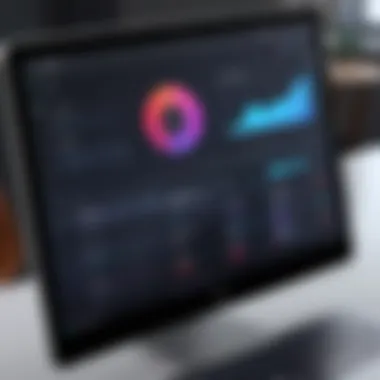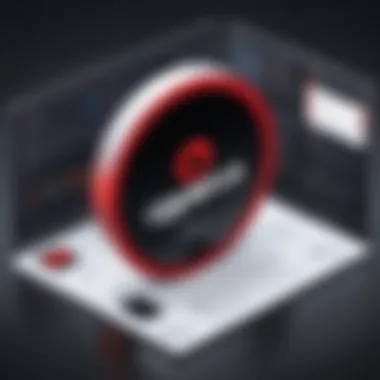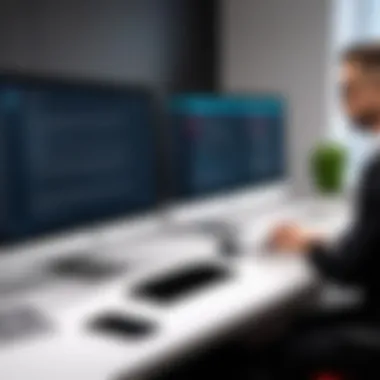Mastering Opera Hotel Software: A Complete Guide


Intro
In the context of the hospitality industry, technology plays a crucial role. Opera Hotel Software emerges as a powerful tool designed to streamline hotel management operations. Understanding this software is essential for both business professionals and decision-makers, as it significantly influences the efficiency of hotel services.
Opera Hotel Software is not just a simple operational tool; it comprises a sophisticated system that integrates various functions essential for running a hotel. This guide seeks to explore the functionalities, benefits, and the implementation of Opera, providing valuable insights to empower users to harness its full potential.
Key Features
Overview of Core Features
Opera Hotel Software boasts numerous core features that cater to the diverse needs of hotel management. Key functionalities include:
- Reservation Management: Simplifies booking processes while minimizing errors.
- Front Desk Operations: Centralizes guest management, check-in/check-out processes seamlessly.
- Housekeeping Management: Tracks room status efficiently, ensuring guest satisfaction.
- Reporting and Analytics: Provides in-depth reports on various metrics that inform better decision-making.
- Payment Processing: Supports multiple payment options, streamlining financial transactions.
These features resonate with the demands of modern hotels, enabling managers to create a cohesive and efficient working environment.
User Interface and Experience
One of the standout characteristics of Opera Hotel Software is its user-friendly interface. Designed with the end-user in mind, the layout facilitates quick access to essential tools and information.
- Intuitive Navigation: Users can easily navigate through different modules without extensive training.
- Customization Options: Businesses can personalize the interface to suit their specific needs, enhancing overall usability.
The user experience is further enhanced by consistent updates to the software, ensuring compatibility with new technology and evolving industry standards.
Pricing and Plans
Overview of Pricing Models
Understanding the pricing of Opera Hotel Software is vital for decision-makers. Typically, pricing models can vary based on factors such as:
- Number of Rooms: Larger properties may incur higher costs due to increased demand for licenses.
- Modules Selected: Businesses can choose specific modules suited to their operational needs, affecting overall pricing.
It is crucial for hoteliers to analyze these pricing models to choose the option that aligns best with their budget and operational strategy.
Comparison of Different Plans
Opera offers various plans tailored to different business sizes and needs. Some plans include:
- Basic Package: Suitable for small establishments, offering essential features at a lower cost.
- Standard Package: A more comprehensive option, it caters to mid-sized hotels with increased functionalities.
- Premium Package: Designed for large hotels or chains, this plan encompasses the full suite of Opera’s features.
Each plan provides distinct advantages, so understanding the specific offerings can help in making an informed choice.
"Choosing the right plan can significantly impact the operational efficiency of a hotel."
Through examining its features and pricing structure, this guide aims to equip hoteliers with the knowledge needed to leverage Opera Hotel Software for optimal results.
Prolusion to Opera Hotel Software
The introduction of Opera Hotel Software sets the stage for understanding its significance within the hospitality sector. This software offers centralized solutions that enhance hotel operations and improve overall efficiency. For anyone in the hospitality business, grasping the core functionalities of Opera can lead to better decision-making and operational excellence.
Understanding the Purpose of Opera
Opera Hotel Software is designed to streamline hotel management processes. It serves as a comprehensive tool that integrates various functionalities into one platform. The primary purpose of this software is to manage reservations, billing, and customer interactions, thereby reducing manual errors and enhancing guest satisfaction.
In practical terms, the software helps hotels manage room availability in real-time, optimize pricing strategies based on demand, and maintain guest records. This level of functionality ensures hoteliers can provide a seamless experience for their guests while maximizing revenue.
History and Evolution of Opera Software
Opera Hotel Software has a rich history that reflects the changing needs of the hospitality industry. Originally developed in the late 1980s, it started as a solution for hotel management but soon evolved with technological advancements. Over the years, Opera has adapted to include features like mobile compatibility and integration with third-party applications.
This evolution has allowed Opera to maintain its relevance, especially in an era where digital solutions are paramount. Understanding this history is essential for appreciating the complexity and capabilities of the software today, which now includes tools for reporting and data analytics to aid strategic decisions.


"As technology continues to advance, Opera Hotel Software remains a pillar of operational efficiency in the hospitality industry."
Core Features of Opera Hotel Software
Opera Hotel Software presents a robust suite of tools designed to support hotel management needs. Understanding its core features is vital for business professionals who seek to optimize operational efficiency and improve guest satisfaction. The functionality of Opera can transform how hotels manage their daily tasks, offering features tailored to enhance various aspects of hospitality operations.
Property Management System (PMS)
The Property Management System is the backbone of Opera Hotel Software. It consolidates multiple functions into a single platform, allowing hotels to manage front or back office tasks more effectively. The PMS enables you to handle check-ins and check-outs, room assignments, and even billing processes with ease. This unified approach reduces the risk of errors that often arise from using multiple systems.
Key benefits of a strong PMS include:
- Streamlined operations: Automation of repetitive tasks saves time and reduces staff workload.
- Real-time data access: Immediate updates regarding room availability and guest information help in making informed decisions.
- Integration capabilities: The PMS can link with other hotel systems, boosting overall performance and coherence in workflow.
Reservation Management
Effective reservation management is crucial for maximizing occupancy rates and revenue. Opera's reservation management tools allow for easy booking, modifications, and cancellations. The system supports both direct bookings and those made through online travel agencies, ensuring that hotels can manage all sources of reservations in one place.
The importance of this feature includes:
- Centralized system: Reservations from various channels are collected in one platform, reducing confusion and manual work.
- Dynamic pricing features: Rates can be adjusted in real-time based on demand, helping hotels to stay competitive.
- Customer insights: The data gathered offers valuable insights into booking trends, allowing for better marketing strategies.
Revenue Management Tools
Opera Hotel Software incorporates advanced revenue management tools that empower hotels to optimize their pricing strategy. These tools analyze market conditions, competitor pricing, and historical data, allowing for smart revenue strategies.
Highlights of these tools include:
- Forecasting capabilities: Predicts demand trends, assisting in proactive planning.
- Competitive analysis: Real-time competitor benchmarking gives insights for rate adjustments.
- Decision-making support: Automated recommendations can aid in pricing strategies to maximize revenue.
Guest Relationship Management
Guest Relationship Management tools are essential for fostering loyalty among customers. Opera helps hotels maintain comprehensive profiles of their guests, tracking preferences, feedback, and history. This feature leads to a more personalized service, enhancing guest satisfaction.
Benefits of focusing on Guest Relationship Management are:
- Increased engagement: Targeted communication strategies can be developed based on guest preferences.
- Improved service delivery: Staff can access guest history quickly, allowing for tailored interactions.
- Loyalty program management: Integration of loyalty programs can incentivize repeat visits, increasing long-term profitability.
Incorporating these core features effectively allows hotels to manage their operations with precision and agility. The seamless integration of PMS, reservation management, revenue management tools, and guest relationship management creates a robust operational environment, driving both operational efficiency and guest satisfaction.
Benefits of Using Opera Hotel Software
Understanding the benefits of using Opera Hotel Software is crucial for any hospitality business aiming to thrive in a competitive market. This software is a comprehensive solution that not only enhances operational efficiency but also significantly improves guest experiences. Furthermore, it offers robust data analytics that empower hoteliers to make informed decisions. The integration of these elements leads to better management practices, increased revenue, and higher customer satisfaction.
Improved Operational Efficiency
Opera Hotel Software streamlines various operations within a hotel, allowing staff to manage tasks more effectively. It helps automate numerous processes such as front desk operations, housekeeping management, and billing, reducing time spent on manual entries. This automation leads to fewer errors and saves valuable employee hours, allowing them to focus on more critical areas.
Moreover, the software facilitates seamless communication between departments. For instance, when a guest checks out, the front desk can instantly notify housekeeping staff through the system. This reduces delays in room readiness and enhances overall guest satisfaction. A more efficient operation not only lowers costs but also improves the hotel's service delivery.
Enhanced Guest Experience
Creating a memorable guest experience is paramount in the hospitality industry. Opera Hotel Software assists in this endeavor by providing tools that personalize guest interactions. It collects and organizes guest preferences and history, which enables staff to tailor their services accordingly. For example, if a guest has previously requested a specific room type or amenities, staff can access this information quickly.
The software also supports flexible booking options. Guests can make reservation changes easily, whether through a hotel website or mobile application. This flexibility caters to the modern traveler, ultimately leading to enhanced satisfaction. Positive guest experiences cultivate loyalty, promoting repeat business, which is vital for long-term success.
Comprehensive Data Analytics
Data plays an essential role in driving business decisions within the hospitality sector. Opera Hotel Software provides intricate data analytics capabilities. By evaluating booking trends, revenue streams, and customer behavior, hotels can identify opportunities for growth and areas needing improvement.
Hoteliers can generate reports that inform pricing strategies, marketing efforts, and staffing needs. For instance, understanding peak booking times allows for optimized resource allocation, ensuring that guests receive attention when they need it most. Additionally, data collected over time can predict trends, helping hotels stay ahead of the competition.
"The right analytics transform data into actionable insights."


Implementing Opera Hotel Software
Implementing Opera Hotel Software is a critical step for any hotel that aims to optimize its operations. This process involves various stages, from initial preparations to actual deployment. The proper implementation ensures that the software runs smoothly and meets all operational needs. It helps staff to familiarize themselves with the software, which can lead to better utilization of its features. An effective implementation can yield several benefits, including increased efficiency in managing reservations, improved guest services, and greater insight into hotel operations through comprehensive data analytics. However, careful consideration is necessary to ensure that all prerequisites are met before diving into implementation.
Pre-Implementation Considerations
Before actually implementing Opera Hotel Software, it is essential to address several key considerations. These steps lay the foundation for a successful setup.
- Assess Current Systems: Evaluate existing hotel management systems. This assessment provides insight into what works and what does not, thereby highlighting areas requiring improvement.
- Define Objectives: Establish clear goals for the implementation. Determine what you wish to achieve, whether it be streamlined operations or enhancing guest experience.
- Budget Planning: Calculate the costs involved in implementing Opera. This includes software licenses, potential hardware upgrades, and training expenses.
- Staff Involvement: Engage with team members early in the process. Collect feedback on their needs and concerns regarding the new system.
- Data Migration Strategy: Plan how to transfer existing data into the new system. This phase is crucial as it ensures that no information is lost during the transition.
Addressing these considerations can make a significant difference in the smooth execution of Opera Hotel Software implementation.
Step-by-Step Implementation Process
Once pre-implementation considerations are addressed, it's time to delve into the actual implementation process. Here’s a structured approach:
- Installation: Begin by installing Opera Hotel Software on the designated systems. Ensure compatibility with current hardware and software configurations.
- Configuration: Adjust the settings to match your hotel’s operational needs. Configuration covers multiple aspects, including front desk operations, reservation settings, and reporting formats.
- Data Migration: Execute the data migration strategy. Validate that all information, including guest records and financial data, has been accurately transferred.
- Testing Phase: Conduct thorough testing of the software. This phase helps identify any potential issues before the system becomes operational. It covers both functional testing and user acceptance testing.
- Deployment: Launch Opera Hotel Software across the hotel. Officially switch from the old system to the new one, ensuring all staff are aware of the changes.
- Monitor Performance: After launching, closely monitor the software performance. Gathering feedback from staff and guests helps in making necessary adjustments.
By adhering to this structured process, hotels can maximize the benefits of Opera Hotel Software.
Training and Support Resources
Proper training is crucial for successful implementation. To better equip your staff, consider the following training and support resources:
- On-Site Training Sessions: Organize during the implementation phase to provide hands-on experience.
- Online Tutorials: Utilize available online resources provided by Opera. These tutorials can cover essential features and best practices.
- User Manuals: Make comprehensive user manuals accessible to staff for reference after training sessions.
- Support Forums: Encourage staff to join user forums such as those on Reddit, where they can share tips and experiences.
- Customer Support Services: Make sure a line of communication is open for technical support post-implementation. This can help resolve any issues swiftly.
Training and support resources play a vital role in helping staff adapt to the new system. They ensure that everyone can efficiently utilize Opera Hotel Software, ultimately promoting a culture of continuous improvement.
Mastering Opera Hotel Software
Mastering Opera Hotel Software is essential for hotel operations in today's competitive hospitality landscape. As one of the leading property management systems, it requires a clear understanding of its functionalities. This section focuses on elements that are crucial for effectively navigating the software. Understanding how to utilize Opera can lead to increased efficiency, better guest experiences, and improved operational insight.
User Interface Overview
The user interface of Opera Hotel Software is designed for ease of use while offering robust functionality. Upon logging in, users are greeted with a dashboard that summarizes key operational metrics. The layout is intuitive, with menus categorically arranged, allowing users to access the desired functions quickly.
Key components of the interface include:
- Main Menu: Contains essential modules such as reservations, guest profiles, and reporting tools.
- Search Functionality: Users can swiftly locate guest information or availability through a unified search bar.
- Notifications Area: Important alerts, such as upcoming reservations or maintenance tasks, are displayed here.
Familiarizing oneself with these layout features is critical to mastering the software and streamlining hotel operations.
Frequently Used Shortcuts
In a fast-paced hotel environment, efficiency is paramount. Mastering the keyboard shortcuts in Opera can significantly reduce time spent on repetitive tasks. Here are some commonly used shortcuts:
- Ctrl + N: Create a new reservation.
- F3: Search for a guest profile.
- Alt + R: Access the reports module.
- F9: Save current changes.
Regular use of these shortcuts can improve operational productivity by minimizing clicks and navigation time.
Customizing User Experience
Every hotel has unique requirements, and Opera Hotel Software allows for significant customization of the user experience. Adjusting settings to meet specific operational needs can lead to greater efficiency. Key aspects of customization include:
- User Roles and Permissions: Administrators can set different access levels for employees, ensuring that sensitive information is only accessed by authorized personnel.
- Dashboard Configuration: Users can tailor their dashboards with the widgets they find most useful, whether it's occupancy rates or daily schedules.
- Language Settings: The software can be configured to support multiple languages, facilitating a smoother experience for diverse staff.
Customization ensures that users can interact with Opera in a way that aligns with their workflow, making it more effective in managing hotel operations.
"Understanding and mastering Opera Hotel Software is not just an asset; it is a necessity for those aiming to excel in the hospitality industry."
Troubleshooting Common Issues
Troubleshooting common issues in Opera Hotel Software is an essential component of effective hotel management. As with any software, errors can arise that may disrupt daily operations. Understanding how to identify and resolve these issues is vital for maintaining a seamless experience for both staff and guests. By having a clear methodology for troubleshooting, hotel personnel can minimize downtime, improve user efficiency, and thereby enhance overall guest satisfaction. This section will elaborate on identifying common errors and provide effective solutions to them.


Identifying Common Errors
The first step in troubleshooting is pinpointing the errors that can occur while using Opera Hotel Software. Common errors often include:
- Login Issues: Problems related to incorrect password entries or locked accounts.
- Data Sync Failures: Challenges with integrating data in real-time across different modules of the software.
- Booking Errors: Issues in the reservation system, such as double-bookings or incorrect pricing information.
- System Performance: Slow response times or application crashes.
Understanding the signs of these errors can save time and resources. Logging error messages and system notifications will also help in diagnosing problems more efficiently. More importantly, staff should be educated and aware of these issues so they can act quickly when they arise.
Effective Solutions
Addressing the errors requires a structured approach. Here are several effective solutions:
- Reset Passwords: For login issues, implementing a straightforward password reset protocol can streamline access.
- Check Network Connectivity: For data sync failures, verifying the stability of internet connections can help identify the roots of the problem.
- Review Booking Policies: To resolve booking errors, administrators should regularly review and update booking parameters to ensure accuracy.
- Optimize System Performance: Regular maintenance, such as clearing cache and updating software versions, can significantly enhance performance.
Additionally, implementing a robust support system will further facilitate troubleshooting. Engaging the helpdesk or utilizing online forums, like those found on Reddit or Facebook groups dedicated to Opera Hotel Software, can offer insights from other users who may have faced similar challenges.
By proactively managing issues and regularly training staff on troubleshooting methods, hotels can ensure a smoother operation overall.
Future Trends in Hotel Management Software
The hotel industry is under constant evolution, adapting to new technologies and consumer demands. Understanding future trends in hotel management software is crucial for maintaining competitiveness. The integration of advanced technologies improves efficiency, enhances guest experiences, and drives revenue. Focusing on trends allows businesses to prepare for changes and leverage new tools effectively.
Integration with AI and Machine Learning
AI and machine learning are becoming integral in hotel management systems, enhancing various operations. These technologies can analyze vast amounts of guest data, enabling personalized experiences. For instance, AI-driven tools can predict guest preferences based on past behavior. This allows hotels to tailor services and offers, resulting in higher satisfaction rates.
Additionally, machine learning algorithms can optimize inventory management and pricing strategies. By forecasting demand, hotels can adjust rates dynamically, maximizing revenue. The incorporation of AI in chatbots also provides 24/7 support, addressing customer queries faster and enhancing guest interaction.
Some benefits of AI and machine learning include:
- Personalization: Customizing offers to match individual guest needs.
- Efficiency: Streamlining operations like check-in/check-out processes.
- Predictive Analytics: Making informed decisions based on data trends.
Organizations must consider the investment and training required for implementing AI solutions. Understanding their advantages helps in making strategic choices that align with business goals.
The Rise of Mobile Applications
Mobile applications in hotel management are gaining traction as more guests prefer mobile solutions. These apps facilitate numerous tasks, including bookings, check-ins, and room service requests. A mobile-friendly platform not only improves convenience for guests but also boosts operational efficiency.
The significant rise of mobile applications results from consumer demand for immediacy and accessibility. Hoteliers who deploy mobile solutions often see an increase in booking conversions. Moreover, such applications enable hotels to communicate effectively with guests, enhancing user engagement.
Key aspects of mobile applications include:
- User-friendly interfaces: Making navigation simple for guests.
- Notifications: Providing guests with timely updates and offers.
- Feedback mechanisms: Allowing hotels to gather guest reviews directly.
The integration of mobile technology in hotel management is not just about providing convenience. It is about creating a seamless experience that encourages loyalty and repeat business.
"In the hospitality sector, leveraging technology is not an option but a necessity to stay relevant in a digital age."
End
The conclusion of this guide serves as a vital recap of Opera Hotel Software's impact on the hospitality industry. Businesses aiming to enhance their operations must recognize the transformative nature of this tool. Opera provides an integrated solution that aligns various aspects of hotel management. From streamlining reservations to optimizing revenue, its functionalities support the foundation of a successful hotel operation.
Several key elements underscore its importance:
- Operational Efficiency: The robust property management system minimizes manual tasks, allowing staff to focus on enhancing guest experiences.
- Data-Driven Insights: Comprehensive analytics capabilities empower decision-makers to identify trends, forecast demands, and adjust pricing strategies accordingly.
- Adaptability: With future trends such as AI integration and mobile applications, Opera's software remains relevant and responsive to emerging industry needs.
Implementing Opera Hotel Software is not merely about adopting a new system. It involves adjusting to a shift in how hotel management functions in a competitive space. Training and development play significant roles here, ensuring that staff are proficient in using the software to its fullest.
In summary, mastering Opera Hotel Software stands as a critical endeavor for hotels striving to improve service and operational performance. The insights gained from effective use of this tool can lead to significant operational improvements and enhanced customer satisfaction. As the hospitality landscape continues to evolve, staying ahead with the right technology will be essential.
Final Thoughts on Opera Hotel Software
Opera Hotel Software represents a cornerstone in modern hotel management technology. Its ability to unify multiple processes into a single platform is advantageous for hospitality professionals. It allows hotels to optimize operations effectively and react quickly to both market changes and customer demands.
Considerations for prospective users include:
- The need for proper training to leverage the software’s full capabilities.
- Understanding the integration and customization options that align with specific business models.
- Continuous evaluation of new features and updates to stay current with industry practices.
By engaging with Opera Hotel Software, hotels can achieve not just operational ease but also a framework for strategic growth. The blend of functionality, support, and adaptability makes it an invaluable asset for the industry's future.







